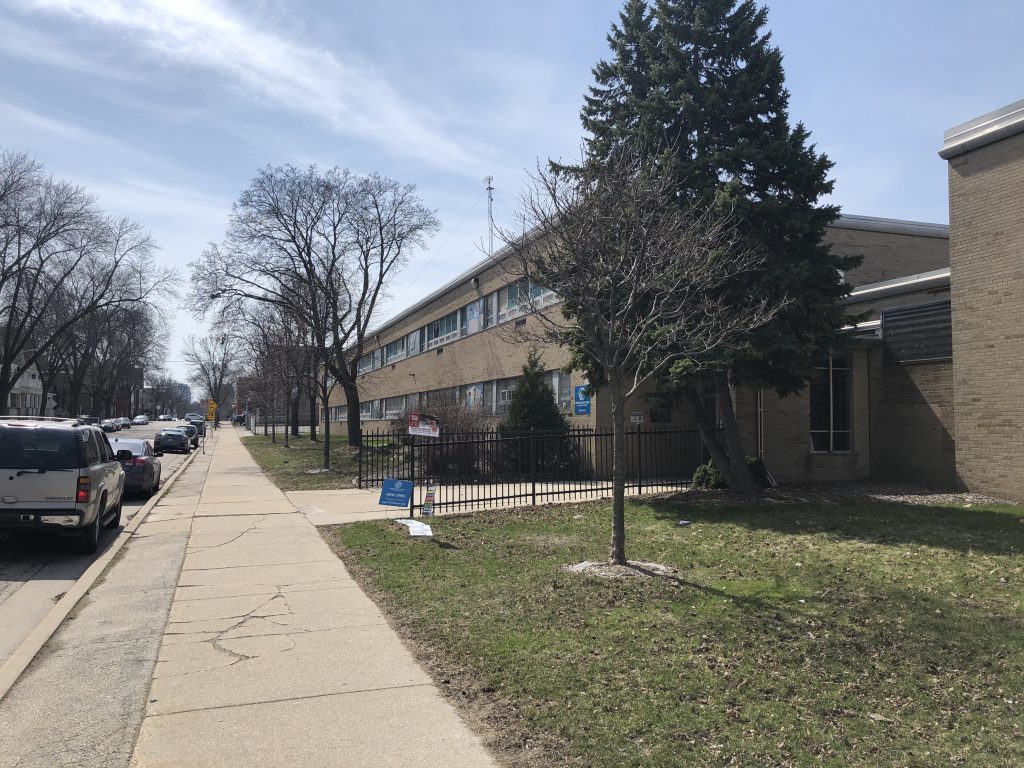Public Schools At Stake in Governor’s Race
Michels wants universal school choice, would dismantle public schools.
A group of heavy hitters in Wisconsin politics announced Thursday that they are forming a coalition to push for universal school choice and “parents’ rights.”
The group, which calls itself the Wisconsin Coalition for Education Freedom, includes Wisconsin Manufacturers and Commerce, Americans for Prosperity, the American Federation for Children, School Choice Wisconsin and the Wisconsin Institute for Law & Liberty.
Michels and Evers are far apart on a lot of issues, from abortion to immigration to how the state runs elections, but one of the most profound impacts of the Wisconsin governor’s race will be the way it shapes the future of education.
Michels’ “education blueprint” calls for an immediate, statewide expansion of Wisconsin’s school choice program. During the Republican primary, Michels criticized his opponent, former Lt. Gov. Rebecca Kleefisch, for not expanding Wisconsin’s school choice program fast enough under former Republican Gov. Scott Walker.
“There is no excuse for slow-walking the empowerment of parents,” Michels said. “I will introduce universal school choice in my first budget in 2023.”
In fact, Wisconsin has hardly slow-walked its parental choice programs. The same players who formed the Wisconsin Coalition for Education Freedom have been working successfully to expand the privatization of the state’s public school system for years.
The American Federation for Children, founded by Trump’s education secretary Betsy DeVos, has spent a little more than $8 million in Wisconsin since 2010 to elect candidates who will siphon off public dollars into private schools.
The group is in the top 10 of the biggest spenders over this period, according to Matt Rothschild of Wisconsin Democracy Campaign. “The school privatization lobby is a huge player in Wisconsin politics,” Rothschild says.
And that lobbying has yielded significant results.
Last September, at the beginning of the 2021-22 school year, DeVos came to Milwaukee to celebrate the 30th anniversary of the school voucher movement, which started in Wisconsin.
During its three decades of existence, Milwaukee’s school voucher “experiment” has grown from 337 students attending a handful of local private schools in 1991 to 28,770 Milwaukee students using a voucher to attend one of 129 private schools last fall. Under then-Gov. Walker, vouchers expanded to Racine, and then statewide. Over the last five years, more than $200 million per year in state money has been spent on vouchers, mostly for religious schools. And by last fall, more than 47,000 students were enrolled in private schools using a voucher in the Milwaukee, Racine and statewide programs.
Selling culture wars, bankrupting schools
The use of taxpayer money to cover private school families’ tuition has been controversial. When the voucher program expanded to Racine, some community members were outraged to learn that most of the families who took advantage of the new voucher program, which pulled money out of the local public schools, had never sent their kids to public school at all.
The same is true of the statewide school voucher program, where two-thirds of participants in the first two years had never sent their kids to public school. Vouchers became a straight-up subsidy for private and religious school families’ tuition.
“The most feasible way to bring about a gradual yet substantial transfer from government to private enterprise is to enact in each state a voucher system that enables parents to choose freely the schools their children attend,” Friedman wrote.
That is exactly the goal Michels and his influential backers are pursuing in Wisconsin.
Using words like “parent empowerment,” proponents of school privatization, who want to dismantle public education, have been latching onto disgruntled parents who were unhappy with online instruction during the pandemic and who are worked up about LGBTQ-positive books in school libraries, kids choosing their own gender pronouns and so-called “critical race theory” in the classroom. Among the goals of the Wisconsin Coalition for Education Freedom is a “Parents’ Bill of Rights” which would encourage lawsuits against school districts that don’t take direction from parents on these issues.
But beyond these flashy culture-war issues is a steady march toward a privatized education system that is on its way to bankrupting Wisconsin’s once-great public schools.
What are the results of this effort so far?
Supporters of Milwaukee’s early voucher experiment claimed that “giving parents more freedom to choose schools, coupled with competition among schools to enroll kids, would drive big improvements in academic success,” veteran education reporter and Marquette University Law School fellow Alan Borsuk wrote in a Milwaukee Journal Sentinel piece last year, recapping 30 years of school vouchers in Milwaukee. Did vouchers improve student success? Borsuk’s conclusion: “Nope.”
Test scores show that voucher students are no better at reading and math than non-voucher students in Milwaukee. “And proficiency rates in both streams of schools have been generally unchanged for years at depressingly low levels,” Borsuk wrote. “Whatever is needed to push the button to start up booming academic achievement, vouchers aren’t’ it.”
Despite this lack of success, Wisconsinites have adjusted to the reality that we are funding two separate school systems, one public and one private, out of the same limited pool of public funds. The expansion of the school choice program, baked into legislation authored by school choice lobbyists and Republicans and signed by Walker, is a ticking time bomb. Enrollment caps are set to move up each year, until they come off altogether in 2026.
Michels and his backers’ impatience to move to a fully privatized program by 2023 just sets off the explosion early.
Ideology overwhelms good sense
As former education chair Rep. Steve Kestell (R-Elkhart Lake) put it in an exit interview with the Sheboygan Press upon his retirement from the Legislature, school choice in Wisconsin “is a case where ideology sort of overwhelms good sense and judgment.”
When it comes to funding two parallel school systems, “the math doesn’t work,” Kestell said. “It just doesn’t work.”
“No one has tried to explain how we’re going to fund parallel school programs,” Kestell warned. “Because that’s where we’re heading.”
In a primary debate, Michels called putting more money into Wisconsin’s public schools “the definition of insanity.” Giving money directly to parents and letting them choose how to spend it would yield a better result, he said.
But despite Michels’ insistence that we are spending more and more money on schools, the state has been moving in the opposite direction, not providing even an inflationary increase to schools for the last couple of decades. During the same period that funding for schools has declined, overall, in Wisconsin, the state has been pouring more money into school choice. And the results are not encouraging.
Evers, in contrast, is proposing to put $2 billion of the state’s more than $5 billion surplus into schools — on top of millions of dollars in federal pandemic relief money he has directed to local school districts, to fill the hole left when Republicans in the Legislature passed a budget that didn’t allow any increase in school spending.
The budget plan Evers announced this past Tuesday lays out a vision for restoring public support for public schools after two decades of decline, during which the state slipped from one of the best funded school systems in the nation to below the national average. Wisconsin can afford to spend more money on kids in classrooms, without raising taxes, Evers argues, because of our unprecedented budget surplus.
Still, a record number of school districts all over the state are going to referendum this fall to request that local taxpayers cover basic operational needs. Despite Evers’ good intentions, they know they can’t rely on the state Legislature to be there for them when federal funds run out.
That stinks, because Evers is right. Given the state’s historic budget surplus, there’s no need for kids to have to live with austerity.
The school choice movement championed by Michels is fundamentally anti-civil-society. If you want to see where it’s heading, look at Arizona, where a new universal voucher system gives parents, including those who never sent their kids to public school, $7,000 in taxpayer money to spend on education however they want — literally liquidating the state’s school system.
The Coalition for Responsible Home Education (CRHE), a nonpartisan advocacy group, condemns the law for its lack of accountability.
And what happens when there’s a rebellion against this form of “welfare” by people who don’t have children? Once you start handing out cash cards to parents, it doesn’t take long before someone argues that if you can’t afford to pay your own kids’ tuition, you probably shouldn’t have kids at all.
As the school choice lobby continues its work, trying to pull society apart, undermining schools, communities and our democracy, Evers is maintaining his vision for fully-funded schools — like we had back in the days of Republican Gov. Tommy Thompson.
It’s worth supporting that vision against the dystopia the school choice lobby is pushing. Meanwhile, the problem of funding two systems remains.
Ruth Conniff, Editor-in-chief of the Wisconsin Examiner
Big question in the governor’s race: Should Wisconsin dismantle public schools? was originally published by the Wisconsin Examiner.
Op-Ed
-
Wisconsin Candidates Decry Money in Politics, Plan to Raise Tons of It
 Dec 15th, 2025 by Ruth Conniff
Dec 15th, 2025 by Ruth Conniff
-
Trump Left Contraceptives to Rot; Women Pay the Price
 Dec 8th, 2025 by Dr. Shefaali Sharma
Dec 8th, 2025 by Dr. Shefaali Sharma
-
Why the Common Council’s Amended Budget is Good Policy for Milwaukee
 Nov 20th, 2025 by Alds. Marina Dimitrijevic and Russell W. Stamper, II
Nov 20th, 2025 by Alds. Marina Dimitrijevic and Russell W. Stamper, II





















